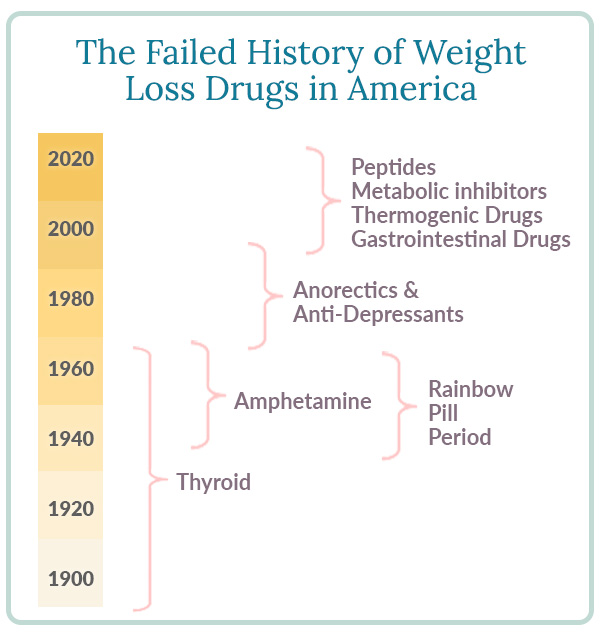Authored by Dr. Sarika Arora, MD
There are plenty of reasons to be skeptical – since 1950, the FDA has withdrawn 25 different weight loss drugs from the market after the vast majority of these drugs caused awful side effects in patients. So today, let’s delve into the research on Ozempic, Wegovy and Rybelsus so that you have the information necessary to make the right decision for yourself – and your health.

What is Ozempic?
Ozempic is the brand name of a medication called “semaglutide,” which has historically been prescribed to help patients with Type 2 Diabetes regulate their insulin levels. Semaglutide mimics a naturally occurring hormone called “glucagon-like-peptide-1” (GLP-1) which binds to receptors in the brain that tell your body it’s full after eating. This sends signals to the pancreas to make insulin, which helps control blood sugar spikes and reduces the health risks associated with unregulated insulin and obesity. By increasing insulin levels and inhibiting glucagon secretion, semaglutide artificially tricks your brain into telling your body that it’s full — even though you’re technically in a caloric deficit. Novo Nordisk, the manufacturer of Ozempic, also claims that Ozempic can increase the time it takes your body to digest and process food, which may further contribute to feelings of “fullness.”
Weight loss “miracle drugs” are nothing new. In fact, drug companies have released dozens of products over the years using similar marketing claims to the statements currently being made by the manufacturers of Ozempic. So where are all the Ozempic predecessors now? Well, the vast majority of them have been pulled from the market due to side effects they cause, especially in long-term use. Whether it’s Contrave being recalled for increasing cardiovascular risk, or Lorcaserin causing tumor growth, the spotty history of questionable weight loss drugs is long and concerning — hence our concern over the marketing surrounding the “latest and greatest” iteration of anti-obesity drugs: Ozempic.
Who is Ozempic for?
Ozempic was approved by the FDA in 2017 for use in patients with Type 2 Diabetes to help regulate their insulin levels. The resulting weight loss that Ozempic patients experienced was a surprising positive side effect, and doctors began prescribing Ozempic to an increasing number of overweight patients without diabetes, a practice known as “off-label use.” Wegovy, a semaglutide medication also manufactured by Novo Nordisk, is FDA-approved to treat obesity. Wegovy is available at a slightly higher dosage compared to Ozempic, and is more readily covered by insurance to support weight loss. Wegovy is usually prescribed to patients with a body mass index (BMI) of 30 or higher, or those with a secondary condition related to obesity, like knee pain or hypertension. In 2022, 40 million people were prescribed semaglutide to treat obesity, diabetes or both.
What about the side effects?
The side effects reported by the 2021 study (which was funded by Ozempic’s manufacturer, Novo Nordisk) included gallbladder-related disorders, acute pancreatitis, gallstones and severe gastrointestinal disorders. “Serious adverse events” were also reported in 9.8% of study participants taking semaglutide. Yet these side effects are relatively innocuous compared to the adverse events self-reported by patients since then:
- Gastroparesis, or stomach paralysis, which prevents digestion from occurring by paralyzing the nerves and muscles along the digestive tract
- Kidney failure and acute kidney injury
- Bowel and intestinal obstruction
- Insulin metabolism disruption, including damage to the gut-brain axis
- Thyroid cancer, specifically medullary thyroid carcinoma
- Diarrhea and nausea
- Ileus
- Pancreatitis
- Suicidal thoughts or ideation
- Gastroenteritis
- Muscle loss
- “Ozempic Face”: a new term for Ozempic-induced facial wasting, i.e. that gaunt, instantly aged appearance of patients who lose volume and fat from their faces as a result of the kind of drastic weight loss that Ozempic delivers

- Sarcopenia
- Multiple endocrine neoplasia syndrome type 2
- Diabetic retinopathy
- Hypoglycemia
- Increased heart rate
- Hair loss
- Development of eating disorders, especially given that semaglutide is now authorized for use in children
- Urticaria, a raised or itchy skin rash
- Infertility, increased risk of miscarriage, low birth weight, and incidences of visceral (kidney, liver, heart, blood vessels) and skeletal (sternebra, cranial bones, vertebra, ribs) fetal abnormalities were observed
- Hypersensitivity reactions, including anaphylaxis
It’s worth noting that approximately 39% of semaglutide-induced weight loss is actually muscle loss, not fat loss. Medications that act on GLP-1 receptors, such as Ozempic and Wegovy, can negatively impact muscle mass, bone density, resting metabolism, and contribute to sarcopenia and osteoporosis. For some patients, side effects (especially stomach paralysis and pancreatitis) did not improve even after stopping semaglutide treatment.
Sadly, the vast majority of patients who lose weight while taking Ozempic or Wegovy report “rebound weight gain” that equals or exceeds the amount of weight they lost. In fact, a 2022 study found that approximately one year after stopping semaglutide treatment, patients had already regained the weight they lost.
Are there any natural solutions?
Given the exorbitant cost of semaglutide medications and the list of concerning side effects, women are understandably hopeful for Ozempic alternatives, especially natural solutions. Berberine, a medicinal plant recently characterized on social media as “Nature’s Ozempic,” may have heart health benefits including potentially lowering cholesterol, fasting blood sugar and weight.
The secret to lasting weight loss? Insulin metabolism
The mechanism behind Ozempic has brought to light a simple fact that we here at Women’s Health Network have been saying all along: It’s not about calories in or out — weight loss starts in your brain.
While the exact mechanism of action remains a mystery, we now know that weight loss is not the simple calories in vs. calories out equation that many women were led to believe. Here at Women’s Health Network, we’ve always believed that insulin metabolism is the true vortex of weight gain — and weight loss. Fortunately, regulating your insulin metabolism is possible through a variety of healthy, affordable methods that are more sustainable than expensive injections or “magic” pills. These methods include:
Supplements: Vitamin C, probiotics and magnesium have all been shown to support blood sugar regulation and reduce insulin resistance.
Sleep! Inadequate sleep has been shown to increase the risk of developing severe insulin resistance and contribute to weight gain.
Increase fiber, reduce sugar: Add more soluble fiber to your daily diet, which can help you feel more full and satisfied between meals. Sources of soluble fiber include black beans, sweet potatoes, broccoli, psyllium husk, flax and sunflower seeds, among others. A nutrient-dense meal full of fiber will leave you feeling satisfied, and less likely to reach for a sweet treat that will spike your blood sugar and lead to fat storage.
Boost your metabolism: M-Boost was developed by doctors to support healthy weight loss using natural herbs and phytonutrients to boost energy, encourage a healthy metabolism and reduce cravings. You can learn more about M-Boost here.
Resistance training. This particular type of exercise has been shown to increase insulin sensitivity at just 2-5 times per week, with no more than 30-45 minutes per session.
Follow your values. A medication is not normal and has side effects as listed above. Resolve the root with your trusted holistic healthcare practitioner and allow your body to come into balance. Be your own power and free will. You have the empowerment to be part of the solution. Understand your environment and your root. You have control over you to bring your personal best in your life.
The benefits of an intentional weight loss strategy that works with your body, not against it, far outweigh the risks associated with chemical injections and “purple pills.” After working with thousands of women throughout the past 20 years, we know that lasting weight loss is not about restricting calories or exercising daily. Whatever you choose, there is a weight loss solution that makes sense for you — and our online library of free articles on natural, sustainable weight loss is here to support you. We believe in you and your ability to create a healthy future — for yourself, and the people you love.
https://www.nejm.org/doi/10.1056/NEJMoa2032183
https://www.ncbi.nlm.nih.gov/books/NBK581942/
https://www.ncbi.nlm.nih.gov/pmc/articles/PMC3424459/
https://www.today.com/health/how-ozempic-affects-mental-health-rcna72029
https://www.nejm.org/doi/10.1056/NEJMoa2032183
https://honehealth.com/edge/health/ozmepic-muscle-loss/
https://jamanetwork.com/journals/jama/fullarticle/2810542
https://dom-pubs.onlinelibrary.wiley.com/doi/10.1111/dom.14725
https://www.frontiersin.org/articles/10.3389/fnut.2022.1013055/full
https://www.ncbi.nlm.nih.gov/pmc/articles/PMC9182772/












